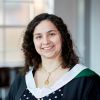
Caroline Avery
- Course: MA History of Science, Technology and Medicine
What made you want to apply to your MA course and to Leeds?
I studied history, philosophy, and chemistry at A Level so I’ve always been interested in a mixture of history, philosophy and science. Following this I moved to Leeds to study my undergraduate degree in Philosophy, Theology and Religious Studies.
The MA course included exactly the mixture of things I was interested in. I had done a few modules in my final year as an undergraduate which related to the history and philosophy of science and medicine and I found them so interesting.
What is it that makes you passionate about your area of study?
I find the subject area very interesting, and it really changes your perspective on a lot of things. The subject can really inform and impact the real world. There’s also a big project I assisted with relating to changes in the history and practice of midwifery which will, hopefully, impact our understanding of the whole profession.
What would you say about Leeds as a city?
I love Leeds. I think it’s just the right size and has everything I could want out of a city. It’s compact but full of things to do. There’s such a friendly attitude that I felt completely at home by the end of my first week. I am hoping to be able to stay in Leeds for the foreseeable future.
What other activities are available for students to take part in outside of their studies, and which ones have you tried out yourself?
There are lots of societies, I have tried out: Henna, Harry Potter, Rubik’s Cube, Sign Language, Opera, Swing Dance and SocieTEA. The History of Science department also has a large collection of objects that students are encouraged to get involved with which has been fun and also has direct relevance to certain career options relating to this course.
What do you plan to do now you’ve finished your course, and how do you think the skills and knowledge you’ve developed at Leeds will help with these plans?
I have remained at the University of Leeds and am now 4 months in to a PhD on the history of medicine. All of the academic training I received as part of the Masters has been vital for this further study.

